
The seas seemed calm and the forecast looked fine as Capt. Kelly Gordon prepared to take her customer's private yacht from the Bahamas back to their home in Florida. She had looked at the forecast and made the decision to cross, which is pretty routine in fair conditions. But as she exited the Northwest Providence Channel and started to traverse the notoriously shallow Great Bahama Bank, a serious storm appeared out of nowhere, kicking up confused seas and buffeting the boat with heavy wind and rain. Suddenly, Gordon was faced with a serious situation: running through the narrow channels with little margin for error. She had a decision to make fast, and how she handled it would determine the safety of her passengers and crew. If caught in the same situation, what would you do?
Weather is the one thing beyond any boater's control. What is in the captain's control is how to plan for and handle inclement weather when it arrives. Fortunately, Gordon had a plan, relying on her training as a 500 GT Master and 15 years of experience at the helm. "Weather and navigation are my favorite parts of my job," she says.
We talked to Gordon about boating and weather, and here's her sage advice.
CHECK AND RECHECK
"Checking the weather before a trip should be your highest priority," Gordon says. "You can have your vessel in tiptop shape and bring aboard all the supplies and spare parts. You can study the best route to your destination and have it all planned out. But if the weather isn't suitable, the rest is irrelevant."
Esta historia es de la edición May 2023 de Boating.
Comience su prueba gratuita de Magzter GOLD de 7 días para acceder a miles de historias premium seleccionadas y a más de 9,000 revistas y periódicos.
Ya eres suscriptor ? Conectar
Esta historia es de la edición May 2023 de Boating.
Comience su prueba gratuita de Magzter GOLD de 7 días para acceder a miles de historias premium seleccionadas y a más de 9,000 revistas y periódicos.
Ya eres suscriptor? Conectar
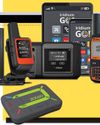
AFFORDABLE SATCOM
Communications devices using satellite technology are more abundant today than any time in the past. What's more, many are portable, ultra-compact, affordable relatively and designed for boating, dispelling any perceptions that you need a big, expensive dome antenna aloft to access satellite communications.

IN THE BEGINNING
REPOWERING FOUNTAIN HULL NO.1
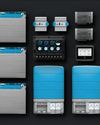
NAVICO GROUP FATHOM 2.0
Engine charging at 48 volts could be a game-changer.

PROPS FOR INNOVATION
Sharrow MX3 propellers live up to most of the company's performance-improvement claims.

MERCURY RACING 500R
Supercharged power for a variety of boats.
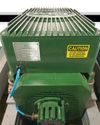
FLIPPING THE SWITCH
Much reporting focuses on reasons why one might choose electric marine power. The issues of range, speed, noise levels, winterizing and ethanol challenges, lake restrictions, environmental concerns and more all must be resolved on an individual basis. Little gets said about how a boater choosing to repower with electric actually gets that accomplished. Is it DIY? And if not, how does it get done?

TOW-VEHICLE TECH
If it's been a while since you bought new tow vehicle, you might be surprised by the many built-in advancements in trailering technology. New tow tech ranges from integrated weight scales and adaptive suspensions to systems that automatically back up your truck to hitch up your trailer. Here are a few examples to look for. -Jim Hendricks

MONUMENTAL TIPS FOR BACKING A TRAILER
Three Boating greats offer advice for a perennial reader query.
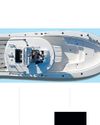
STICKING POINTS - Anchoring alternatives, and why you will always need a traditional anchor.
My brother-in-law likes to fish offshore reefs, and the process once entailed navigating to a mark, dropping a float, and idling upwind or up-current to drop the anchor in hopes the set would drop us back to the float.
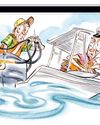
FOR WANT OF A CLAMP
When 100 miles from shore, home and help, this boater’s preparedness prevented potential catastrophe.